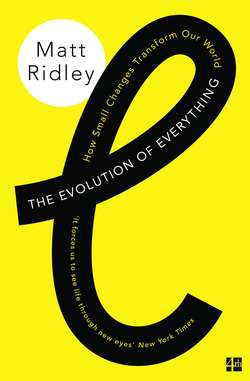Читать книгу The Evolution of Everything: How Small Changes Transform Our World - Matt Ridley, Matt Ridley - Страница 12
The puddle that fits its pothole
ОглавлениеBriefly in the late twentieth century, some astronomers bought into a new skyhook called the ‘anthropic principle’. In various forms, this argued that the conditions of the universe, and the particular values of certain parameters, seemed ideally suited to the emergence of life. In other words, if things had been just a little bit different, then stable suns, watery worlds and polymerised carbon would not be possible, so life could never get started. This stroke of cosmic luck implied that we lived in some kind of privileged universe uncannily suitable for us, and this was somehow spooky and cool.
Certainly, there do seem to be some remarkably fortuitous features of our own universe without which life would be impossible. If the cosmological constant were any larger, the pressure of antigravity would be greater and the universe would have blown itself to smithereens long before galaxies, stars and planets could have evolved. Electrical and nuclear forces are just the right strength for carbon to be one of the most common elements, and carbon is vital to life because of its capacity to form multiple bonds. Molecular bonds are just the right strength to be stable but breakable at the sort of temperatures found at the typical distance of a planet from a star: any weaker and the universe would be too hot for chemistry, any stronger and it would be too cold.
True, but to anybody outside a small clique of cosmologists who had spent too long with their telescopes, the idea of the anthropic principle was either banal or barmy, depending on how seriously you take it. It so obviously confuses cause and effect. Life adapted to the laws of physics, not vice versa. In a world where water is liquid, carbon can polymerise and solar systems last for billions of years, then life emerged as a carbon-based system with water-soluble proteins in fluid-filled cells. In a different world, a different kind of life might emerge, if it could. As David Waltham puts it in his book Lucky Planet, ‘It is all but inevitable that we occupy a favoured location, one of the rare neighbourhoods where by-laws allow the emergence of intelligent life.’ No anthropic principle needed.
Waltham himself goes on to make the argument that the earth may be rare or even unique because of the string of ridiculous coincidences required to produce a planet with a stable temperature with liquid water on it for four billion years. The moon was a particular stroke of luck, having been formed by an interplanetary collision and having then withdrawn slowly into space as a result of the earth’s tides (it is now ten times as far away as when it first formed). Had the moon been a tiny bit bigger or smaller, and the earth’s day a tiny bit longer or shorter after the collision, then we would have had an unstable axis and a tendency to periodic life-destroying climate catastrophes that would have precluded the emergence of intelligent life. God might claim credit for this lunar coincidence, but Gaia – James Lovelock’s theory that life itself controls the climate – cannot. So we may be extraordinarily lucky and vanishingly rare. But that does not make us special: we would not be here if it had not worked out so far.
Leave the last word on the anthropic principle to Douglas Adams: ‘Imagine a puddle waking up one morning and thinking, “This is an interesting world I find myself in – an interesting hole I find myself in – fits me rather neatly, doesn’t it? In fact it fits me staggeringly well, may have been made to have me in it!”’
